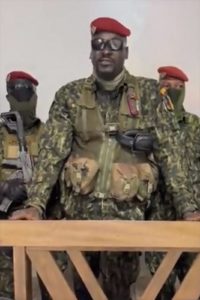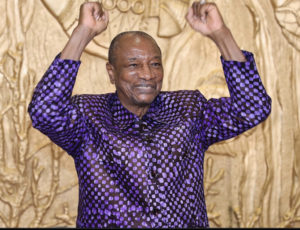Onumba.com — “A coup d’état is not good,” but sometimes, it is the only option left.
That sentiment came from a frustrated Guinean man Mamadou Saliou Diallo who lives in Senegal. He expressed that view following the ouster of 83-year old President Alpha Conde by a cabal of rebellious soldiers led by 41-year old Col. Mamady Doumbouya.
Diallo, like most Africans, is opposed to military coups, but he’s had enough of his feckless president. He echoed the feeling of a vast majority of people on the continent who are profoundly sick and tired of their useless leaders.
“We know that a coup d’état is not good,” noted Diallo, who strongly believes in democracy as the favored path to political office.
“A president must be elected by democratic vote,” he said. “But we have no choice. We have a president who is too old, who no longer makes Guineans dream and who does not want to leave power.”
Not included in that depressing chronicle of grievances is the Holy Grail of all the problems bedeviling Africa: corruption, in all of its ugly and ubiquitous mutations and manifestations. Conde and his son are being accused of massive pilfering from the government till.
Who knows how much of the people’s dough the president has stolen?
Corruption, mismanagement, squandering public money on foolish oversea trips and government leaders not being serious about solving the people’s problems explain why Saliou is angry and frustrated.
Those reasons and more also explain why a coup took place to remove President Conde from office. Shortly after Doumbouya announced he had overthrown the government, folks from the United Nations, African Union and ECOWAS wasted no time reacting, and as usual, yakking up their old hackneyed denunciation.
Please don’t get me wrong. Coups are awful. We all get that. Africans intensely loathe military coups. That said, it is also disappointing and loathsome for these holier than thou groups (United Nations, African Union and ECOWAS) often condemn military coups, which is perfectly fine, but then would do nothing to help stem the tide of the gathering cloud of issues often justifying coups in these countries. That folks, is the thorny conundrum. Political observers, nation building analysts and third world talking heads love to tiptoe around this massive elephant in the parlor. Of course, it is the job of these watchdog organizations to voice opposition to coups. And they do that pretty well.
But it is worth repeating that it makes absolutely no sense for these influential cabals to habitually look the other way as corruption and mismanagement fester out of control in these politically fragile nations often dangling aimlessly. True, these are sovereign nations and should be left alone to manage their own affairs. I completely get that. Well, in that case, live them the eff alone to sort out their own palaver (Nsogbu fa) the way they see fit. All things considered, the core point I am trying to convey is this: Suffering Africans are profoundly sick, tired and frustrated, and their political leaders are often the problem.
While the trifecta of United Nations, African Union and ECOWAS does a fabulous job offering enabling environment, effective template, global rampart and cozy shelter for corrupt African leaders, protecting them from the credible wrath and rage of the suffering hoi polloi, which often manifest as protests, riots, revolutions and yes military coups, who, I ask, is going to step up to protect these hapless African people from the buffoonery and wickedness of their pitiful leaders. Who is going to represent them against these shameless charlatans, against these avarice, power-driven, idiotic kleptomaniacs?
Who? Who is going to offer them a modicum of soothing succor in the face of blatant idiocy and corruption of these African politicians?
The following poignant example will help locate all of this in a compelling context. The whole world watched as Machiavellian Conde illegally and brazenly hornswoggled, maneuvered his way to a third term in office. He changed the constitution allowing him to remain in power. It is common in Africa. Obviously, Conde didn’t think so, but it was unconstitutional. Yet, and sadly, the United Nations, African Union and ECOWAS did absolutely nothing. Why didn’t representatives from these organizations scold this unscrupulous, power glutinous lout to dissuade him from such undemocratic indulgence?
Why didn’t someone, anyone say to him, Sir, you really can’t do that?
It was all cricket.
So, what does it all tell us, my people? It tells us that as the continent more and more embraces democratic dogma manifesting by way of not supporting military coups, it appears African leaders are becoming emboldened to cling on to power by any means necessary, the most popular means being tinkering with the constitution, obviously, not fearing the possibility of the military being pissed off and stepping in as in the past.
“It is hugely important to note that a politician who willfully trashes the constitution to stay in office is just as wrong and reckless as a soldier who brazenly ignores the law of the land to gain power.” Ike Mgbatogu
Even now, a simmering stew of political and jingoistic issues could boil over anytime in Cameroon where 88 year-old octogenarian Paul Biya is doggedly clinging on to power after 38 years at the helm. Think about it for a moment, folks: 38 long years in power. Does Biya own Cameroon? Of course not. Yet, he openly behaves as though he is King Biya, in a squalid, underdeveloped country where now his looming departure from power is stoking real fear of a potential political and social tinderbox.
If, heaven forbid, Cameroon ultimately collapses into a post Biya mess, compounded by the brutal and worsening conflict over agitation for an independent nation of Ambazonia in Cameroon’s Anglophone region, you can count on a cavalcade of spokesmen from the United Nations, African Union and maybe ECOWAS too, to converge on the scene in a chorus condemning the fallout —— they would come to unleash an avalanche of criticism aimed at a convenient target, even though representatives of all the three organizations watched with arms folded as the country droned on in crippling crisis and ululation over the years, with the sprawling mess crystallizing unabated.
You would think folks from the United Nations, African Union and ECOWAS would strongly condemn Biya now for refusing to disengage from power. But no, they choose a cowardly posture of standoffish laconism and mindless taciturn about it. Expect them to show up in full force after something goes awry, yapping to restore both order, and if it was a bloodless coup, the ousted leader, as well. Then a flurry of threats to impose economic sanction would follow.
As for those who see this rebellion as a setback for Guinea and argue that these undesirable African leaders be tossed from office at the ballot box rather than through military coups, I wholeheartedly agree. Honestly, I do. But I also believe that confining this matter to the contours of a simplistic take rather a panoramic assessment of the thorny issues therein reduces a very serious question of a people’s survival to a thing of jejune wrapped up in a flawed approach for solving the problem. In short, not embracing a broad posture in confronting this matter amounts to a fatal vandalism of commonsense, for, it is unhinged, delusional, a pipe dream, at best, for anyone to believe Biya and his thick-headed buddy in Uganda Yoweri Musevini, are suddenly going to start losing elections. Please be serious.
Leaders who linger on and on and on in power, and it is not as though they are productive, are in a essence holding their countries hostage. It is a political standoff, and often it does not end quietly for these power hoarding leaders. That tragic prognosis played out vividly in Libya with Muammar Gaddafi, in Zimbabwe with Robert Mugabe, in Gambia with Yahya Jammeh, in Burkina Faso with Blaise Compaore and most recently in Chad with Idris Derby.
All these leaders had one thing in common: They all outstayed their welcome, and were either killed or disgracefully removed from office. Ghadafi, shortly before he was killed, found himself crying for leniency in a road side drainage ditch, miles removed from the sprawling, gold laced palatial pad he once called home.
Taken together, I agree, coups are “bad,” as Diallo aptly noted. But sometimes, it is easy to see why soldiers lose their cool as more and more African countries drift from an era of military dictators to now grappling with democratic dictators.






